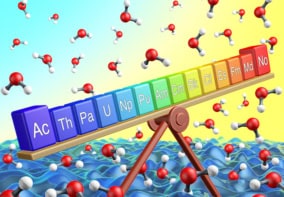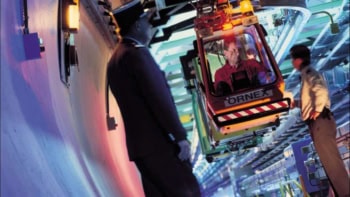The first Africa-led experiment at CERN is currently taking place at the Geneva-based lab’s ISOLDE facility. Researchers from the University of the Western Cape (UWC) in South Africa are studying the isotope selenium-70 to better understand how its nuclei shape relates to its energy levels. The group hopes that its presence at CERN will be a source of inspiration for other African scientists.
“The first thing it tells people in South Africa is that if we – a historically disadvantaged institution – can do it, any university in South Africa can do it,” says experimental lead Nico Orce of UWC. Determined to share the opportunity with as many colleagues as possible, Orce assembled a team of 11 people, which is more than the usual number for this type of experiment on ISOLDE. The team has nicknamed the experiment Ubuntu, a Xhosa word meaning “I am, because we are.”
Radioactive particles on tap
CERN’s Isotope Mass Separator On-Line (ISOLDE) facility provides the experiment with a low-energy beam of selenium-70 nuclei. These are smashed into a platinum target, which puts the nuclei into an excited state. By observing the gamma rays given off as the nuclei decay, the team can calculate the shape of the nuclei in the excited state. Results will test fundamental nuclear models and may also be relevant to nuclear astrophysics.
“UWC has a real battle to get funding and Nico has jumped through so many hoops to get here,” says David Jenkins of the University of York in the UK who co-led the experiment. “I wanted to get them involved at ISOLDE and help build the research expertise in the team.”
Capacity building
In supporting the African physics community, CERN works with other organizations including the Institute of Physics, which publishes Physics World. Both organizations support the African School of Physics, which seeks to build the continent’s capacity in fundamental research and its applications. In a related programme, when CERN upgrades computing equipment in its control centre it donates servers and other kit to African nations including Ghana and Senegal.
Perhaps the biggest impact of this first Africa-led experiment at CERN will be its symbolic importance in Africa and beyond. “Follow our lead” is the message the group wants to convey. “I’m so proud to be the only woman on this experiment and I feel like I’m representing all other women from Africa,” says MSc student Senamile Masango. “I would like to motivate all other women as well to come to science, to come to physics.”
A second South Africa-led experiment is already scheduled at ISOLDE. A team led by Hilary Masenda from the University of Witwatersrand will study the lattice sites, charge and spin states of iron using Mössbauer spectroscopy.
The above video is courtesy of Christoph Madsen and CERN.



